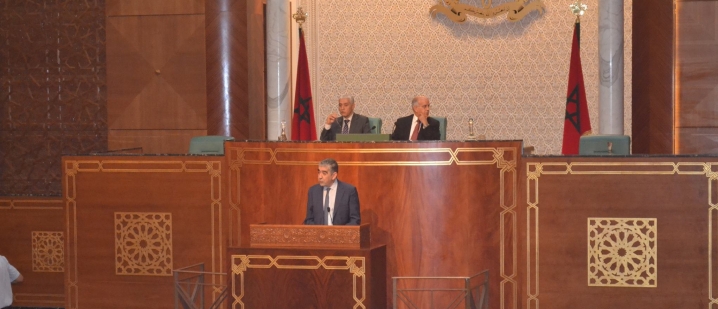CNDH Chairman addresses parliament on human rights in Morocco

Chairman of the National Human Rights Council, Mr. Driss El Yazami, addressed the two Houses of Parliament on human rights, on June 16th, 2014. He was invited by Parliament in implementation of the Constitution, in line with the guiding principles of the National Human Rights Institutions (Paris Principles) and the “Belgrade Principles” which define the relationship between national human rights institutions and parliaments.
In his opening remarks, Mr. El Yazami shed light the conclusions of the Council main activities and campaigns. These included the follow-up of the implementation of the Equity and Reconciliation Commission’s recommendations, vulnerable group rights, parity, gender equality and violence against women and girls, following-up social events, torture and ill-treatment allegations complaints, freedom of association, freedom of the press and freedom of expression, promotion of human rights culture, capacity building, etc.
Mr. El Yazami shed light as well on the Council’s contribution to democracy building and public debate. Indeed, he said, “the Council published several advisory opinions and memorandums on several draft laws, including the organic law related to the House of Representatives, the Bill on fundamental guarantees granted to the military, the organic law related to the Higher Council of the Judiciary, the organic law on the statutes of judges, alternatives to incarceration and the pardon procedure, the Military Justice Code, the organic laws on the Constitutional Court and of the Exception of Unconstitutionality, the domestic workers bill, the access to information Bill, a memorandum on the freedom of association, etc.
He highlighted several recommendations to improve, promote and protect human rights in Morocco:
Torture and ill-treatment
The CNDH identified several structural hinders to a complete eradication of torture. These include lack of safeguards for the prevention of torture in police custody and pretrial detention, absence of provisions on the immediate and systematic use of medical expertise to confirm or refute torture allegations, the non-established role of forensic science in investigating torture allegations, etc.
In this regard, the CNDH recommended that:
- Any one in police custody should, under the Penal Code, have the right to immediately contact a lawyer
- audio-visual recording during investigation;
- entrusting the CNDH with the mandate of the National Prevention Mechanism to carry out announced and unannounced visits to places of detention, monitor the treatment of and conditions for detainees, etc.
Peaceful protests
- Establishing the right to peaceful protest and limit discretionary authority of the administration, that can be used to prevent peaceful protests;
- agreeing upon principles, to be observed by everyone, on how to organize and deal with the right to peaceful protest, which should not affect the rights of citizens to the services of public and private facilities;
- strengthening the role of the judiciary as an effective redress mechanism, etc.
Freedom of the press
To establish and uphold freedom of expression and freedom of opinion, the Council recommends the urgent and comprehensive revision of the law governing media and publishing sector (especially printed media), repealing the provisions providing for the deprivation of liberty in the Press Law, etc.
Vulnerable groups
- Adopting a legal framework to protect the human rights of persons with disabilities on the basis of an inclusive, and human rights-based approach and a participatory approach;
- adopting regional and local public policies that protect the human rights of persons with disabilities;
- developing a new legal framework regulating mental and psychiatric hospitals;
- developing a legal framework for the protection of juveniles and children in conflict with the law, etc.
Migration
- accelerating the adoption of the asylum law and law against trafficking in persons;
- drafting and adopting the migration law and the relevant sectoral laws,
- greater participation of civil society organizations, etc.
Promotion of human rights culture
- Including human rights in the national school curricula,
- the institutionalization of the human rights-based approach to approve educational projects and programs;
- accepting and managing diversity, and promoting the values of tolerance and peaceful conflict management, etc.
Elections
- Automatically register citizens in the electoral lists, when they apply for their national identity cards;
- correcting imbalances and disparities regarding the electoral boundaries; ensuring equal representation of the population,
- taking into consideration the positive geographical discrimination for the sparsely populated areas or remote areas with difficult to access, but within a reasonable percentage;
- providing in electoral laws for the appointment of a financial agent for each candidate or a list of candidates, the opening of a bank account for election campaign expenses, and granting campaign assistants the status of employees on fixed-term contracts;
- adopting explicit provisions indicating that gatherings and expressions calling for elections boycott are subject to the Public Freedoms Code;
- providing for mechanisms to facilitate the vote for persons with limited mobility, Moroccan nomads, Moroccans living abroad, eligible detainees, workers in the economic activities that require high mobility, patients in hospitals, and students residing outside the circles of their parents residence;
- given the limited use of proxy voting process, the CNDH recommends replacing with correspondence or electronic voting, for Moroccans living abroad;
- respecting accessibility terms in the polling centers, in accordance with the Convention on the Rights of Persons with Disabilities and the obligations of public authorities under article 34 of the Constitution;
- amending Law # 30.11 laying down the terms and conditions of neutral and independent elections observation, to provide for the accreditation of international inter- governmental organizations; etc.






















